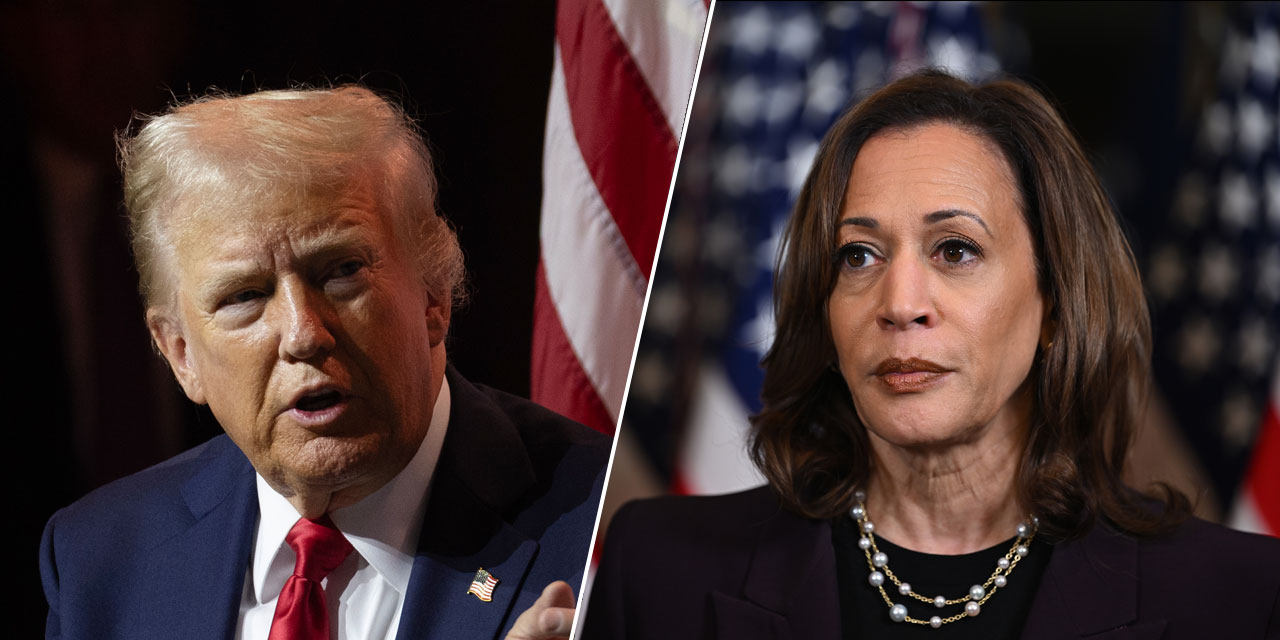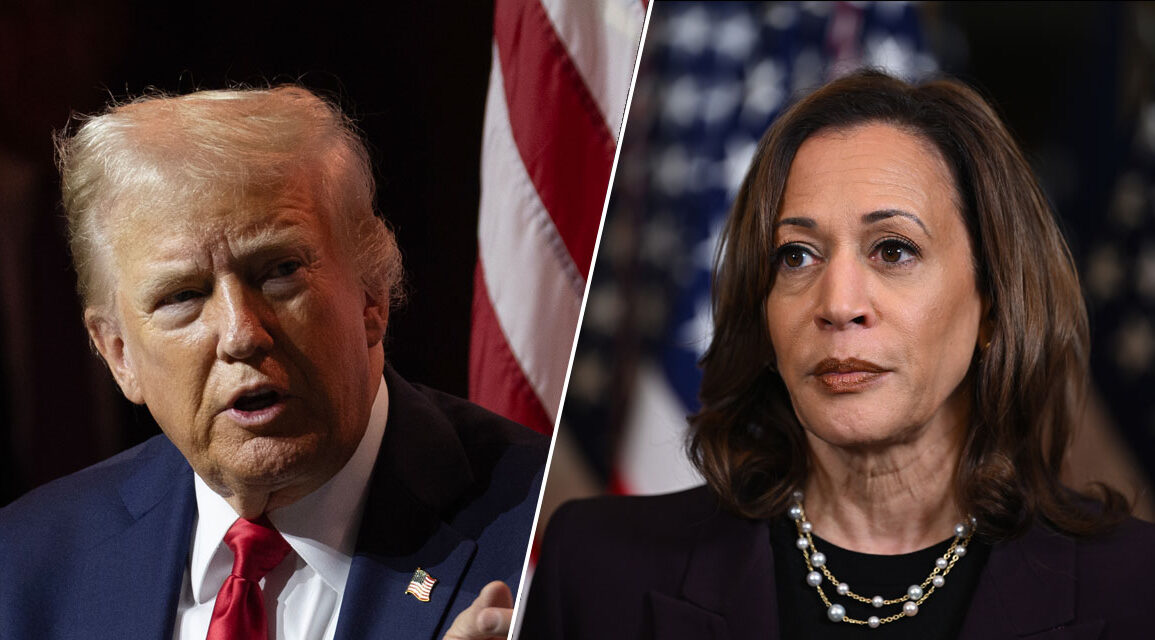
Donald Trump’s recent comments about Kamala Harris’s shifting racial identity were an unforced error. It was a certainty that Trump would be unable to navigate the arcane and ever-evolving taboos around race without saying something that would provide fodder for several days of front-page “Trump is a racist” coverage in the New York Times and other media outlets.
This latest episode of racism-hunting is worth examining in some detail, however, since it reveals how topsy-turvy the current definition of “racism” has become.
Trump voluntarily walked into the lion’s den last Wednesday, facing off against a panel of interviewers at the National Association of Black Journalists convention in Chicago. That is to his credit; let us see if Kamala Harris would be willing to take questions at, say, a gun-owners’ convention. After a string of adversarial questions, ABC News reporter Rachel Scott asked Trump whether he thought it was acceptable for some of his supporters to label Harris a “DEI hire,” and whether he would tell them to stop doing so. Trump responded: “How do you define DEI? Go ahead.” Scott translated the acronym: “Diversity, equity, and inclusion.”
This was not, of course, what Trump was getting at. He pushed on, but as usual, failed to clarify his intent: “OK, yeah, go ahead, is that what your definition is?” Scott stood her ground: “That is literally the words.” Scott and Trump went back and forth in the same vein for a few more rounds before Scott finally articulated what DEI means in practice: “Do you believe that Vice President Kamala Harris is only on the ticket because she is a black woman?”
Trump then reframed the issue: “Well, I can say, no. I think it’s maybe a little bit different. So, uh, I’ve known her a long time, indirectly, not directly very much. And she was always of Indian heritage, and she was only promoting Indian heritage. I didn’t know she was black until a number of years ago when she happened to turn black and now, she wants to be known as black. So I don’t know, is she Indian or is she black? I respect either one but she obviously doesn’t because she was Indian all the way, and then all of a sudden she made a turn and she became a Black person.”
These are the observations that have been labelled “overtly racist,” a manifestation of racial “animus,” disparagement of the vice president in “clearly racial terms,” a “lie,” and one of a “barrage of vicious attacks” on Harris. But were they any of these things?
Trump has some facts on his side. The Sacramento Bee in 2017 offered its readers the opportunity to “watch Kamala Harris [be] sworn in as first Indian American senator.” The AP noted after the 2016 election: “California’s Kamala Harris becomes first Indian American United States senator.” Before the 2020 presidential election, Harris promoted herself on Southeast Asian media as “the first candidate for vice president of the United States of South Asian descent.” Before she dropped out of the Democratic presidential primary in 2019, she went on an Indian television show to cook an “Indian recipe,” because, as the host said, she was “Indian,” to which assertion Harris replied, “Yes, yes.” (On the basis of such facts, the New York Times’s recent assertion that “throughout her career in law and politics, Ms. Harris has identified as Black” is incorrect.)
But it is also true, as has been endlessly pointed out in the aftermath of the Trump interview, that Harris attended Howard University and belongs to a black sorority. Harris leveraged one side or the other of her racial and ethnic background during her political career depending on which, at any given moment, would yield maximum advantage. That hoary tradition of ethnic politics long preceded the diversity scam. In recent years, the black side of Harris’s identity promised the biggest dividends, so, as Trump pointed out, “now, she wants to be known as black.”
It is not the purpose of this essay to figure out the current state of racial rules regarding dual identity, beyond observing that they will inevitably be ad hoc and configured to trap the unwary. Finding logic or consistency in those rules became a fool’s game when academia adopted the position that race is a “social construct,” not a biological reality, while at the same time flogging any hapless person who claims not to see the race of an “underrepresented” minority and, most disastrously, who quotes Martin Luther King Jr.’s dream about being judged by the “content of [one’s] character.” Such a naïf will be accused of erasing the very essence of that “underrepresented” minority by not seeing his now very real, not just “constructed,” race.
But what can be noticed about this current scourging is the reversal of what used to be understood as racism. When white supremacy had a firm purchase in the United States, the way to discredit someone was to assert that he was black. The “one-drop rule” was wielded against seemingly white people to cast them into the pariah status of blackness. The idea that a political contender would fight back against the claim that he was anything other than black would have been regarded as surreal. Why would anyone insist on being the one thing that puts him at the bottom of the social and political totem pole?
Today, however, the benefits of blackness are so patent that it is white (and even Indian-American) individuals who on occasion try to pass as black. Many more whites, especially white males, would put their identities down as black on college admission forms and academic job applications if they thought they could get away with it. By contrast, these is no evidence of black applicants labelling themselves as white; blacks today know which way the wind is blowing. If, as we have gleaned from the hysteria over Trump’s recent Harris remarks, it is now racist to question someone’s black identity, it is also preposterous to claim that that black identity subjects someone to systemic racism.
(The New York Times added a new twist to the racism accusation in its Sunday print edition: Trump was “othering” Harris by claiming that she has only recently embraced a black persona. This hilarious aping of academic jargon is just as contradictory as the more straightforward racism charge. According to standard leftist narrative, white America “others” blacks because they are black, not white. But now, per the Times, Trump has “othered” Harris by allegedly denying her her blackness.)
Pointing out such contradictions is beyond the capacity of Trump or any other politician. Trump’s instincts may be sound, but he will continue to go up against a buzzsaw every time he tries to articulate the hypocritical state of racial politics. Whether it is worth trying to do so anyway is not something that he will carefully assess. He will be guided by impulse. It will be up to the rest of us to decide whether to embrace the media-academic-industrial complex’s definition of a racist or to care to whom it is applied.
Photos: Scott Olson/Getty Images (left) / Kenny Holston-Pool/Getty Images (right)


